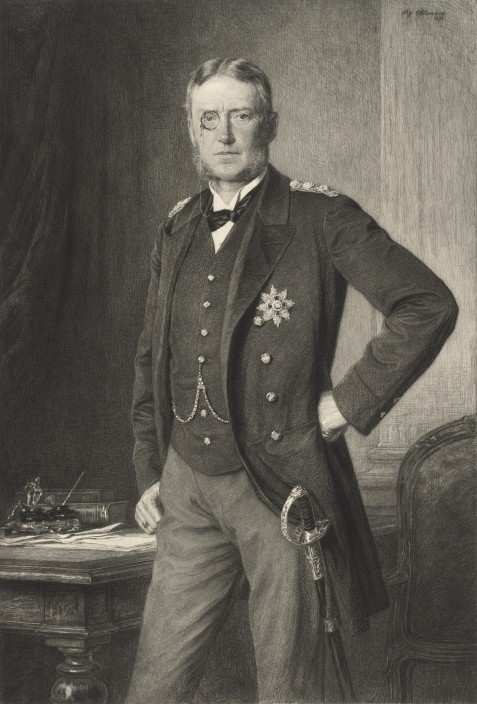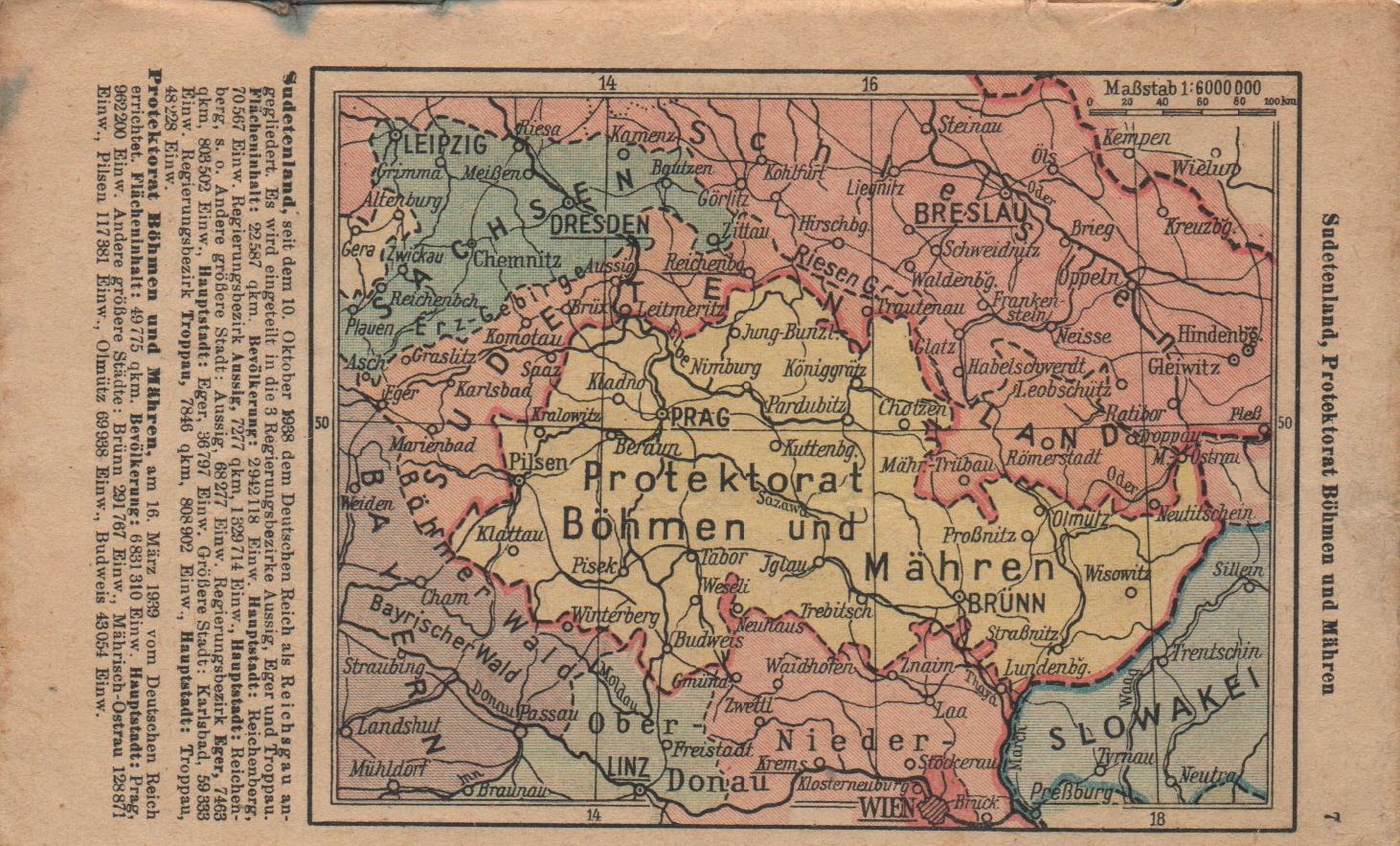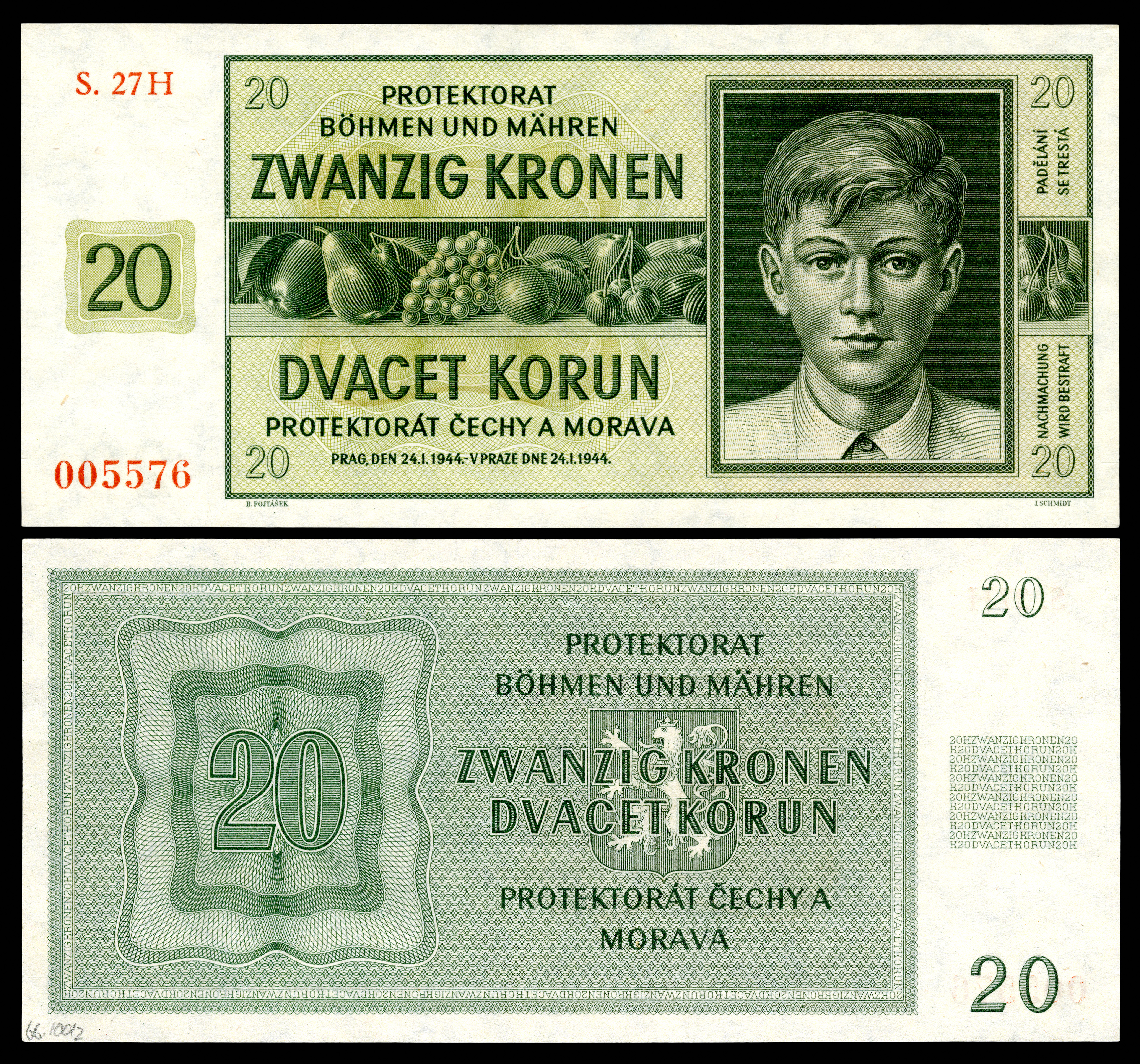Friedrich Janka (1878–1957)
Friedrich Janka was born on 28 October 1878 in Chomutov (Komotau), a German-speaking town in Northern Bohemia. His father was Karl Emanuel Janka (1839–1917), a District Commissioner, and his mother Franziska Wieshofer (1839–1915), a brewer’s daughter. Friedrich spent most of his childhood and youth in Prague, where his father worked at the Bohemian Governor’s Office. Karl came from a rural environment – his father was a farmer and his mother’s family were farmers as well. However, he studied law at university and started a career in the state administration. He became a Senior Governor’s Office Official, District Captain and finally Junior Governor’s Office Councillor. Before his retirement in 1904 he was promoted to a Senior Councillor. He died in Prague on 7 July 1917.
In 1903 Friedrich received a degree in law at German Charles-Ferdinand University in Prague. Shortly afterwards, he began to work at the Bohemian Governor’s Office as a trainee official. At that time his father Karl was still employed in this institution as a Junior Councillor. Karl retired soon after his son got this job. It is very likely that Friedrich’s path to the Governor’s Office was much smoother than his father’s and that Friedrich’s position was secured by his family connections. In 1905 Friedrich was promoted to a junior official and transferred to Liberec (Reichenberg), a large German-speaking town in Northern Bohemia. After two years he returned to Prague and continued his career at the Governor’s Office. In 1908 he became a District Commissioner and in 1911 a Senior Official. In the same year he married Božena Anna Mayer (* 1880), daughter of a brewer Josef Mayer (1846–1902).
At that time Czechs and Germans held long negotiations about their position within the Habsburg Empire. There were several topics which were discussed during these negotiations – the use of language at state offices, processing and translating documents, determining which districts will be monolingual and which bilingual, administrative reforms and changes in the election rules and finally, schools for ethnic minorities. Friedrich Janka played an important part in these talks. He was responsible for German meeting proceedings and communication between the Governor’s Office in Prague and the Ministry of the Interior in Vienna. The Bohemian Governor Franz Thun (1847–1899) trusted Friedrich with confidential information and relied on him. Although the negotiations as a whole did not succeed, Friedrich proved his abilities and was promoted.

Franz von Thun und Hohenstein (1847–1916) od Siegmunda l'Allemand (1840–1910).
However, in October 1918, when the Czechoslovak Republic was established, Friedrich was forced to leave his current position, because of his German origin and loyalty to the previous regime. Since he could not retire yet, he got a job as a translator of important legal documents, including the Czechoslovak Constitution. In the late 1930s, the political situation in Central Europe was about to change immensely again. In September 1938 the Munich Pact was signed and Czechoslovakia ceded large territories to Germany. On 27 October Friedrich celebrated his 60th birthday and was entitled to pension, so a month later he wrote a request for retirement. By the end of the year, it was approved.
A few months later, the German army invaded what was left of former Bohemian lands and the Protectorate Bohemia and Moravia was established. A massive Germanisation of all social spheres followed. Friedrich probably saw this as an opportunity and decided to acknowledge his German background. In a questionnaire for the determination of German nationality from July 1939 Friedrich and his family confirmed that they were German citizens, members of NSDAP (National Socialist German Workers' Party) and several German clubs. Friedrich also requested reinstatement in the political administration and became a Governmental Commissioner. After his return to the active service, Friedrich complained about losing his position in 1918 and asked for compensation, which he was given. He worked for almost three years and applied for pension again. In 1944 he retired for the second time. Thanks to these three years in public service, his pension increased significantly – from 49,800 crowns to 80,160 crowns per year.

Map of Protectorate of Bohemia and Moravia from a German pocket atlas, 1939–1940.

Protectorate of Bohemia and Moravia 20 korun (1944) banknotes were issued during the German occupation of Czechoslovakia.
Friedrich had only one son – Friedrich Karl Josef (later called Fritz), who was born on 16 November 1913 in Prague. Fritzʼs career flourished in the Protectorate as well. In 1939 he worked as a lawyer for Ast Prag – German military-intelligence service in Prague. He was a member of several German clubs, the same NSDAP group as his father and a candidate for SA – the paramilitary wing of the party. In 1942 he was recruited into the German army, but it is not clear whether he survived the war or not.
When the war ended, Friedrich was once again on the wrong side. In May 1945 he lost his pension and a few months later he was investigated for breaking the presidential decree no. 16 from 19 June 1945. According to this law, as a member of NSDAP he was supposed to be sentenced to five to twenty-five years’ imprisonment. The questionnaire for determination of German nationality was used as evidence in Janka’s personal file. It is not clear if he was actually condemned or not. It is more likely that he was expelled from Czechoslovakia like other German citizens.
The story of three generations of Bohemian Germans from the Janka family reflects the realities of life in four different regimes, which changed within a relatively short period of time. Karl was born into a family of farmers and it was university education which helped him to improve his social status. As a civil servant he was able to support his son Friedrich’s career at the Governor’s Office. Friedrich used this opportunity but lost his position after the Czechoslovak Republic was created. During the Protectorate period he shortly regained his former status but as a member of NSDAP he could not stay in Czechoslovakia after the end of war.
Literature and sources:
Eva Drašarová, “Die Rolle der Konzeptsbeamten bei der politischen Lösung der nationalen Beziehungen in Böhmen. Das Beispiel von Statthaltereisekretär Friedrich Janka,” in Führer, Akteure hinter den Kulissen oder tatenlos zuschauende? Der deutsch-tschechische Ausgleich an der Wende vom 19. zum 20. Jahrhundert aus der Perspektive der Vertreter der Staats- und Selbstverwaltung edited by Martin Klečacký and Martin Klement (edd.).
Martin Klečacký, Převzetí moci. Státní správa v počátcích Československé republiky 1918–1920 na příkladu Čech. Český Časopis historický 116, 2018, 693–732
Martin Klečacký et al., Slovník představitelů politické správy v Čechách v letech 1849–1918 (Praha: Masarykův ústav a Archiv AV ČR, v.v.i., Národní archiv, 2020).
Luboš Velek, “Projekt česko-německého národnostního vyrovnání v Čechách v letech 1890–1915 a jeho geneze”, in Promarněná šance. Edice dokumentů k česko-německému vyrovnání před první světovou válkou. Korespondence a protokoly 1911–1912, I, eds. Eva Drašarová, Roman Horký, Jiří Šouša and Luboš Velek: (Praha: Národní archiv, 2008).
Die Verfassung der Tschechoslowakischen Republik. Prag 1922–1923 (two volumes).
Dekret č. 16/1945 Sb, § 3. Dekret presidenta republiky o potrestání nacistických zločinců, zrádců a jejich pomahačů a o mimořádných lidových soudech. Accessible at https://www.zakonyprolidi.cz/cs/1945-16.
National Archives, fonds Prezidium zemského úřadu (PZÚ) – personal files, box 25, personal file – Bedřich Janka.
State Regional Archives in Litoměřice, Collection of registers, call number 2615, sign. 62/21, 363.
State Regional Archives Plzeň, Collection of registers of the West Bohemian Region, Plasy 16, 14.
Friedrich Janka (1878–1957)
Friedrich Janka was born on 28 October 1878 in Chomutov (Komotau), a German-speaking town in Northern Bohemia. His father was Karl Emanuel Janka (1839–1917), a District Commissioner, and his mother Franziska Wieshofer (1839–1915), a brewer’s daughter. Friedrich spent most of his childhood and youth in Prague, where his father worked at the Bohemian Governor’s Office. Karl came from a rural environment – his father was a farmer and his mother’s family were farmers as well. However, he studied law at university and started a career in the state administration. He became a Senior Governor’s Office Official, District Captain and finally Junior Governor’s Office Councillor. Before his retirement in 1904 he was promoted to a Senior Councillor. He died in Prague on 7 July 1917.
In 1903 Friedrich received a degree in law at German Charles-Ferdinand University in Prague. Shortly afterwards, he began to work at the Bohemian Governor’s Office as a trainee official. At that time his father Karl was still employed in this institution as a Junior Councillor. Karl retired soon after his son got this job. It is very likely that Friedrich’s path to the Governor’s Office was much smoother than his father’s and that Friedrich’s position was secured by his family connections. In 1905 Friedrich was promoted to a junior official and transferred to Liberec (Reichenberg), a large German-speaking town in Northern Bohemia. After two years he returned to Prague and continued his career at the Governor’s Office. In 1908 he became a District Commissioner and in 1911 a Senior Official. In the same year he married Božena Anna Mayer (* 1880), daughter of a brewer Josef Mayer (1846–1902).
At that time Czechs and Germans held long negotiations about their position within the Habsburg Empire. There were several topics which were discussed during these negotiations – the use of language at state offices, processing and translating documents, determining which districts will be monolingual and which bilingual, administrative reforms and changes in the election rules and finally, schools for ethnic minorities. Friedrich Janka played an important part in these talks. He was responsible for German meeting proceedings and communication between the Governor’s Office in Prague and the Ministry of the Interior in Vienna. The Bohemian Governor Franz Thun (1847–1899) trusted Friedrich with confidential information and relied on him. Although the negotiations as a whole did not succeed, Friedrich proved his abilities and was promoted.

Franz von Thun und Hohenstein (1847–1916) od Siegmunda l'Allemand (1840–1910).
However, in October 1918, when the Czechoslovak Republic was established, Friedrich was forced to leave his current position, because of his German origin and loyalty to the previous regime. Since he could not retire yet, he got a job as a translator of important legal documents, including the Czechoslovak Constitution. In the late 1930s, the political situation in Central Europe was about to change immensely again. In September 1938 the Munich Pact was signed and Czechoslovakia ceded large territories to Germany. On 27 October Friedrich celebrated his 60th birthday and was entitled to pension, so a month later he wrote a request for retirement. By the end of the year, it was approved.
A few months later, the German army invaded what was left of former Bohemian lands and the Protectorate Bohemia and Moravia was established. A massive Germanisation of all social spheres followed. Friedrich probably saw this as an opportunity and decided to acknowledge his German background. In a questionnaire for the determination of German nationality from July 1939 Friedrich and his family confirmed that they were German citizens, members of NSDAP (National Socialist German Workers' Party) and several German clubs. Friedrich also requested reinstatement in the political administration and became a Governmental Commissioner. After his return to the active service, Friedrich complained about losing his position in 1918 and asked for compensation, which he was given. He worked for almost three years and applied for pension again. In 1944 he retired for the second time. Thanks to these three years in public service, his pension increased significantly – from 49,800 crowns to 80,160 crowns per year.

Map of Protectorate of Bohemia and Moravia from a German pocket atlas, 1939–1940.

Protectorate of Bohemia and Moravia 20 korun (1944) banknotes were issued during the German occupation of Czechoslovakia.
Friedrich had only one son – Friedrich Karl Josef (later called Fritz), who was born on 16 November 1913 in Prague. Fritzʼs career flourished in the Protectorate as well. In 1939 he worked as a lawyer for Ast Prag – German military-intelligence service in Prague. He was a member of several German clubs, the same NSDAP group as his father and a candidate for SA – the paramilitary wing of the party. In 1942 he was recruited into the German army, but it is not clear whether he survived the war or not.
When the war ended, Friedrich was once again on the wrong side. In May 1945 he lost his pension and a few months later he was investigated for breaking the presidential decree no. 16 from 19 June 1945. According to this law, as a member of NSDAP he was supposed to be sentenced to five to twenty-five years’ imprisonment. The questionnaire for determination of German nationality was used as evidence in Janka’s personal file. It is not clear if he was actually condemned or not. It is more likely that he was expelled from Czechoslovakia like other German citizens.
The story of three generations of Bohemian Germans from the Janka family reflects the realities of life in four different regimes, which changed within a relatively short period of time. Karl was born into a family of farmers and it was university education which helped him to improve his social status. As a civil servant he was able to support his son Friedrich’s career at the Governor’s Office. Friedrich used this opportunity but lost his position after the Czechoslovak Republic was created. During the Protectorate period he shortly regained his former status but as a member of NSDAP he could not stay in Czechoslovakia after the end of war.
Literature and sources:
Eva Drašarová, “Die Rolle der Konzeptsbeamten bei der politischen Lösung der nationalen Beziehungen in Böhmen. Das Beispiel von Statthaltereisekretär Friedrich Janka,” in Führer, Akteure hinter den Kulissen oder tatenlos zuschauende? Der deutsch-tschechische Ausgleich an der Wende vom 19. zum 20. Jahrhundert aus der Perspektive der Vertreter der Staats- und Selbstverwaltung edited by Martin Klečacký and Martin Klement (edd.).
Martin Klečacký, Převzetí moci. Státní správa v počátcích Československé republiky 1918–1920 na příkladu Čech. Český Časopis historický 116, 2018, 693–732
Martin Klečacký et al., Slovník představitelů politické správy v Čechách v letech 1849–1918 (Praha: Masarykův ústav a Archiv AV ČR, v.v.i., Národní archiv, 2020).
Luboš Velek, “Projekt česko-německého národnostního vyrovnání v Čechách v letech 1890–1915 a jeho geneze”, in Promarněná šance. Edice dokumentů k česko-německému vyrovnání před první světovou válkou. Korespondence a protokoly 1911–1912, I, eds. Eva Drašarová, Roman Horký, Jiří Šouša and Luboš Velek: (Praha: Národní archiv, 2008).
Die Verfassung der Tschechoslowakischen Republik. Prag 1922–1923 (two volumes).
Dekret č. 16/1945 Sb, § 3. Dekret presidenta republiky o potrestání nacistických zločinců, zrádců a jejich pomahačů a o mimořádných lidových soudech. Accessible at https://www.zakonyprolidi.cz/cs/1945-16.
National Archives, fonds Prezidium zemského úřadu (PZÚ) – personal files, box 25, personal file – Bedřich Janka.
State Regional Archives in Litoměřice, Collection of registers, call number 2615, sign. 62/21, 363.
State Regional Archives Plzeň, Collection of registers of the West Bohemian Region, Plasy 16, 14.

